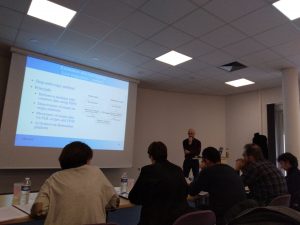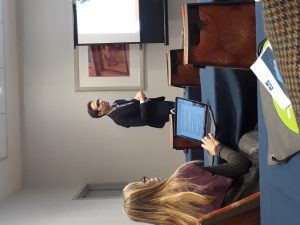Author's posts
Jun 17
Secured replication in peer-to-peer collaborative systems – PhD Defense Victorien Elvinger
A collaborative application allows multiple users to edit a shared content. Collaborative peer-to-peer environments aim to design applications with desirable properties: high-availability, low-latency, fault-tolerance, and scalability. Every peer (user) modifies her own copy of the content. Concurrent modifications of the copies lead to their divergence. Replication protocols are responsible for the convergence of copies. These …
Apr 15
Soutenance de HDR – Claudia Ignat – 23/04 à 15h
Large-scale trustworthy distributed collaborative systems Most existing collaborative systems rely on a central authority and place personal information in the hands of a single large corporation which is a perceived privacy threat. Moreover, these systems do not scale well in terms of the number of users and their modifications. My research work aims to …
Feb 01
PhD Defense 3-2-2021 – Béatrice Linot – La confiance dans les situations de travail collaboratifs médiatisés par des environnements numériques
Beatrice will present her work the 3/2/2021 2pm in front of Myriam Lewkowicz – Université de Technologie de Troyes Franck Ganier – Université Bretagne Occidentale, LABSTICC Caroline Rizza – Telecom Paris Aurélie Montarnal – École des Mines d’Albi-Carmaux\ Valérie L. Shalin – Wright State University France has experienced several disasters in the last …
Jan 05
PhD Defense 14-1-2020 – Hoai Le Nguyen – Étude des conflits dans l’édition collaborative
Collaborative Editing (CE) has long captured the attention of Computer-supported-cooperative work (CSCW) researchers. Early researches about CE (in the 1990s and the early 2000) focused on describing different characteristics of CE based on interviewing people who had participated in some CE projects. Some recent researches about CE started analyzing the logs of CE activities to …
Jan 05
PhD Defense 12-1-2020 : Quentin Laporte-Chabasse – Étude morpho-statistique des réseaux sociaux. Application aux collaborations inter-organisationnelles.
Decentralised collaborative applications address privacy, availability and security issues related to centralised collaborative platforms. Such applications are based on a peer-to-peer communication paradigm according to which all users are directly connected to one another. Collaborations tend to widen and spread beyond the borders of organisations. Under these circumstances, it is necessary to guarantee to …
Jan 25
PhD defense of Guillaume Rosinosky – Elasticity and BPMaaS – 23-1-2019
Wednesday, January 23 2019 at 14:00 in room A008 in the LORIA. The jury is composed of : Reporters: Walid Gaaloul – full professor at Telecom Sud Paris Salima Benbernou – full professor at Université Paris Descartes (absent) Examiners: Malika Smail – associate professor at Université de Lorraine, LORIA Parisa Ghodous – full professor at Université Lyon I, LIRIS Invited: Duy Tran Quang – manager at Bonitasoft …
Aug 28
Claudia-Lavinia Ignat is doing a Keynote at CRIWG conference 2018
CRIWG 2018 24th International Conference on Collaboration and Technology Costa de Caparica, Portugal — September 5-7, 2018 From group to large scale trustworthy distributed collaborative systems http://criwg2018.csites.fct.unl.pt/keynotes.html
Mar 28
From cognitive psychology to Trust Theory – by Siavash Atarodi – 30/3/2018 – B013
Seminar by Siavash Atarodi From cognitive psychology to Trust Theory This thesis, which was part of a European research project, focuses on the problem of the reluctance of elderly people to use ICTs. More specifically, it focuses on the psychosocial factors that influence the attitudes of people aged 62 and over towards ICTs. We conducted …




